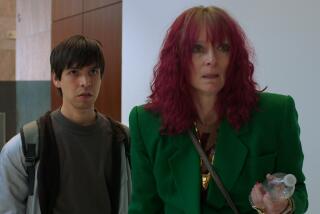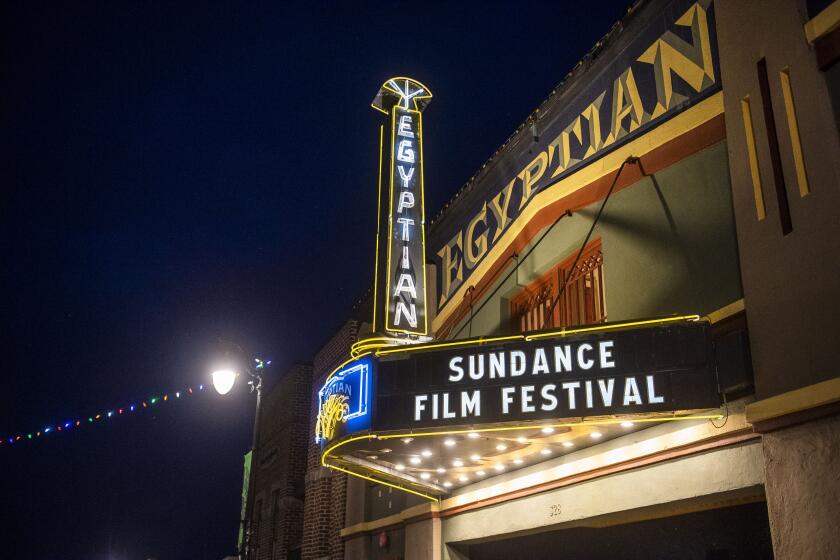NYFF: In interview, Richard Pena recounts pride, fatigue, a little remorse
NEW YORK--In a quarter-century at the helm of the Film Society of Lincoln Center and the New York Film Festival, Richard Pena has become more associated with a U.S. movie gathering than anyone not named Robert Redford.
Pena’s work has been extensive behind the scenes as he’s led a group that chooses what to screen at one of the country’s most prestigious film institutions. But it also has played out publicly, with Pena, who also teaches at Columbia University, taking the Lincoln Center stage countless times over the last 25 years to interview the world’s biggest directors with a kind of erudite flair-cum-wonkishness.
In this period, he’s overseen the opening of several dedicated Film Society movie theaters--including the Walter Reade and the Elinor Bunim Monroe--as well as shepherded an organization through several boom-and-bust cycles, both economic and cinematic.
Pena, 58, is set to leave his post shortly after this year’s festival, part of a long-planned retirement. (His new job will be taken by two people.)
Movies Now caught up with the cinema-world fixture at the New York Film Festival to talk about why he’s leaving, the ever-changing difficulties of art film and his greatest pride and shame.
Movies Now: It feels to me like you’re leaving in a period as difficult as any the art-house world has ever known. Does it feel that way to you?
Richard Pena: This festival was founded in 1963, at a certain point of public interest in alternative forms of filmmaking. When you think back to the ‘60’s you had “Last Year at Marienbad” and “L’Avventura.” And these movies were getting commercial releases, not one but several movie theaters. Where does that happen today? That easy sense that these films will simply pass into the art-house circuit isn’t true.
MN: How deep does the challenge go?
RP: I think it goes pretty deep. There’s a graying of the audience. People in their 20s and 30s don’t really have an interest in alternative cinema. Alternative cinema to them is an American independent. When I was in college we were all wildly interested in cinema. I have a friend who lives in Durham, N.C., and he comes up the first week of the New York Film Festival every year. This is a financial guy who has nothing to do with cinema. But he’s always here.
MN: Did you feel a responsibility as a film-festival head to try to change that?
RP: On the one hand there’s a duty to the medium to put out the best at the festival. And on the other we don’t want to feel like we’re irrelevant, that we’re the latest poetry reading. It’s nice when one of our films go on and has a life and it’s nominated for an Oscar. The distributors have a really hard job, and I do feel a certain duty to them. I won’t take everything but I’ll work with them. I want our art to be relevant, and if a film only shows here or at other festivals and never shows in the outside world part of me feels like I failed.
MN: The festival world has exploded in the 25 years since you arrived, whether it’s Tribeca here in New York or the ascendancy of gatherings like SXSW and Toronto, or even genre-movie gatherings. Has it started to feel like there’s just too much competition?
RP: I grew up at a time when people said the festival they meant the N.Y. Film Festival. And now that’s not so true. We live in a time when festivals have proliferated to an almost unbelievable rate. There must be a good 70 festivals in New York alone of various stripes. It no longer has that specialness and that aura. That has been a challenge to what we can do. I think we’ve dealt with it by staying true to who we are. I don’t think we change with the times; I don’t think we should open up an iPhone section. I think we basically said this is what we do it and we do it very well.
MN: Some festivals have responded by going more celebrity. You’ve done that a little—you have some star-driven gala screenings--but it’s been measured.
RP: I’d rather people discover us than have us go out and try to discover them. The moment you change yourself you’re sort of lost. I don’t put anyone down; I know how hard this world is. But you can have specialized boutiques and big department stores. I don’t think one negates the other.
MN: Every film festival these days talks about digital distribution as a way of expanding its reach, or at least staying relevant in a Netflix era. Is that a pipe dream?
RP: I don’t think it is. Look a the Film Society. We have the name and the access, and the clout to a certain extent. Hopefully we could set up a deal where it would continue to feel like a curated program. We can do VOD, maybe not for a film festival but for [retrospectives] at the Walter Reade, where there are five films on Channel X for the next few weeks. The problem is that on cable it’s so undifferentiated. But there are a lot of things you can do. There are some negative points but a lot of exciting stuff.
MN: The opening night has become a high-profile launch pad in recent years, and not just for the festival but for some of Hollywood’s biggest studios. It’s a kind of a significant platform. How consciously have you wanted that?
RP: Opening night for the last 25 years has been the bane of my existence. You don’t want to take a film that does not deserve to be there. On the other hand it has to be a film that’s conducive to an extra-large party and accessible to all the donors and benefactors and people who don’t come to the rest of the festival. It’s a hard challenge. And you don’t make them; you’re subject to what’s out there.
MN: Which openings are you most proud of?
RP: I’ve think I’ve had a couple of successes. ‘Good Night and Good Luck.’ ‘The Social Network.’ ‘All About My Mother.’ ‘Secrets and Lies.’
MN: Anything you wish you hadn’t slotted there?
RP: My third N.Y. Film Festival we opened with ‘Miller’s Crossing.’ It’s a film I like very much and I think one of the Coens’ very best. But it got a scathing review from Vincent Canby in the N.Y. Times that morning and the audience really went in primed to dislike it. Twenty minutes in people began streaming out. There were 2,700 people at the start and I don’t think 1,000 at the end. That’s the nightmare. You’re sitting there with filmmakers and people are just streaming out.”
MN: Speaking of people leaving, I have to ask about a period a few years ago when the festival went through some turmoil. Mara Manus was brought in as an executive director, and there were personnel shakeups and an open secret that many Film Society veterans were unhappy.. She’s been gone about two years, but how do you look back at that period now?
RP: It was a very fraught time. It’s hard to speak about it. At the time I think there was a belief, at least at first, that an outside vision can come in and ‘shape up’ the Film Society. And then I think there was a feeling that in the shaping up we were losing form, and as we were turning our back on the past there was no really clear plan for the future.
MN: Were you happy with how you handled it?
RP: I think I chose for various self-serving reasons to try and stay as much as I could above the fray. It’s something I look back on with a certain degree of shame. I think I probably should have been much more involved. Part of my sense was ‘I’m doing the art thing and you’re doing the managerial thing, and you’re not going to tell me about art and I’m not going to tell you about management.’ But I think that was a mistake.
MN: It has to be tough to walk away and hand over the reins after a run like this. It would be like Brett Favre walking away--well, bad example--
RP: Or Michael Jordan. [Laughs].
MN: Exactly. People say they’re OK with it but then they find it too hard to be out of the game.
RP: I’m delighted to let other people do it. I had 25 years; I had a pretty good bite at it. I’m happy to move on and try other things. I don’t feel I have to be in the driver seat. There are other things I want to do. The thing about the job is that it’s truly a merry-go-round. It just never stopped. People would say, ‘The festival is over; take a vacation. Let the theater lie fallow for a couple of months.’ But you can’t do that. You’ve always had to have exciting programs. We now not only have the [linchpin] Walter Reade but [two new commercial screens at] the Elinor Bunim Monroe. It’s never stopped, and that’s a bit of a strain.
MN: So what are some of those other things you want to do?
RP: I still teach at Columbia, and I’ll curate events in various place as I’m invited. But I’m also looking forward to slowing down with my family, some time cooling out.
MN: I’m trying to picture Richard Pena cooling out.
RP: [Laughs] Maybe I’ll find with my personality this is truly impossible. But I don’t think so. This has all been fairly considered. I’m very happy with how everything’s gone in terms of my leaving and my succession,. I don’t have any problems walking out the door and feel like everything will continue nicely and that the Film Society is in good hands.
ALSO:
NYFF: With ‘Life of Pi,’ Ang Lee devises a new math
New York Film Festival at a crossroads as L.A. figures take lead
NYFF: Noah Baumbach says ‘Frances Ha’ is his post-Beatles moment
Follow me on Twitter at https://twitter.com/ZeitchikLAT
More to Read
Only good movies
Get the Indie Focus newsletter, Mark Olsen's weekly guide to the world of cinema.
You may occasionally receive promotional content from the Los Angeles Times.







